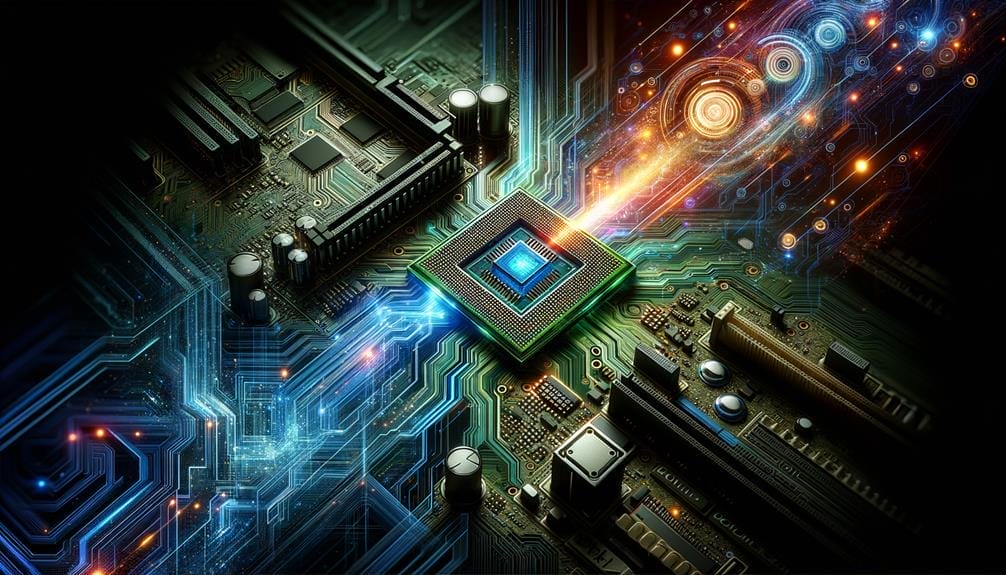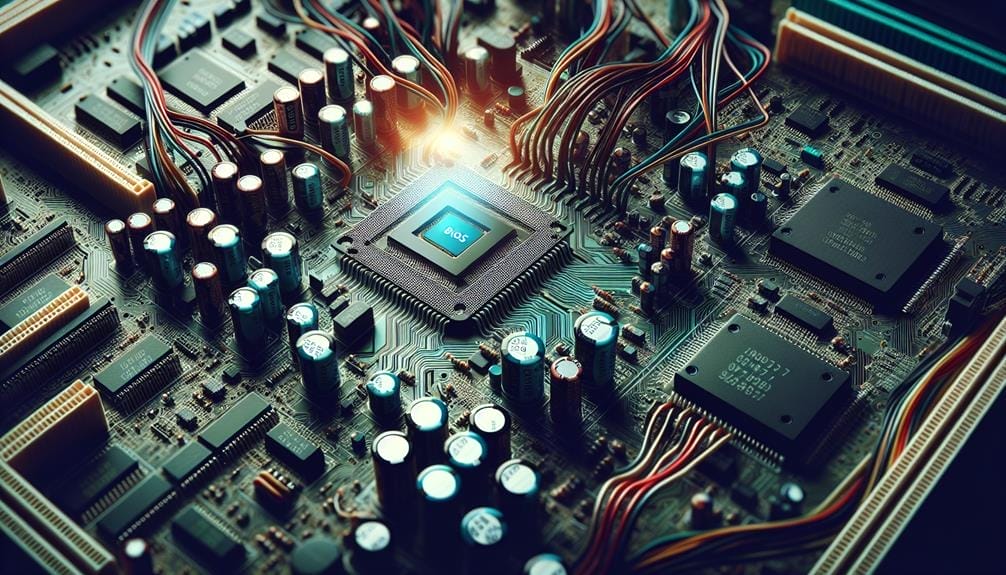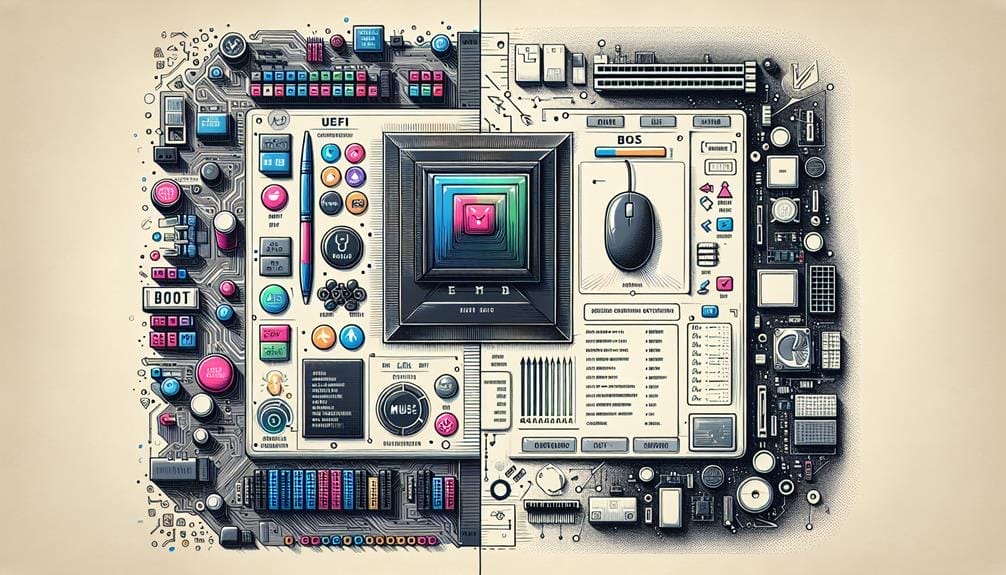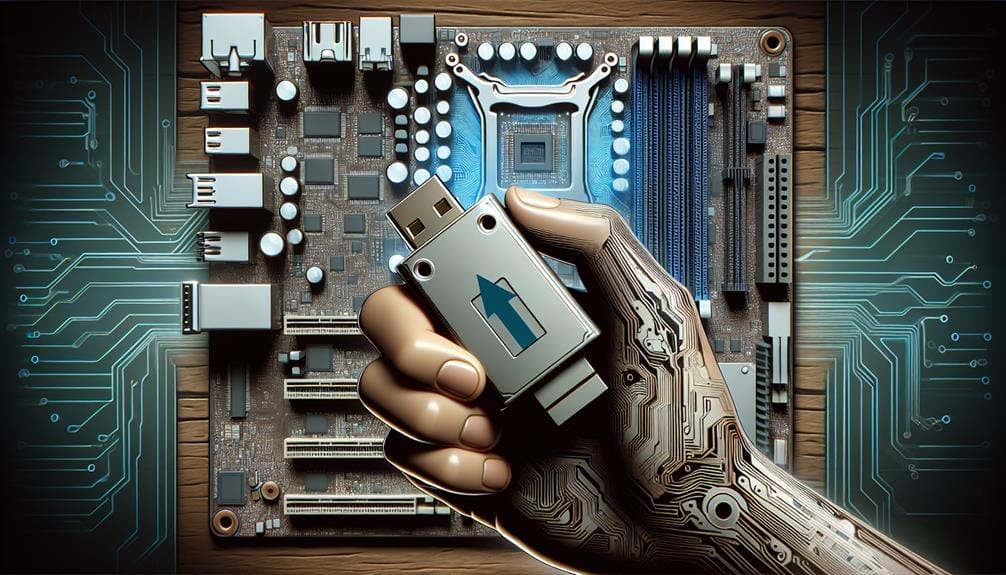Unlock PC Potential: Update Your BIOS Now

Are you looking to boost your computer’s performance and discover hidden capabilities? Consider a BIOS update to potentially unlock improved performance and reveal functions you might not have known existed.
But before you dismiss this as just another mundane tech task, consider the impact it could have on your overall computing experience. There's more to BIOS updates than meets the eye, and by the end of this discussion, you'll understand why this seemingly simple update could be the game-changer your PC needs to reach its full potential.
Key Takeaways
- Updating the BIOS can improve system compatibility with new CPUs and hardware.
- BIOS updates address security vulnerabilities and provide additional security measures.
- Updated BIOS versions can unlock new features and improve hardware performance.
- Precautions should be taken before updating the BIOS to ensure a safe and successful update.
Understanding BIOS

Understanding the BIOS is crucial for effectively managing the fundamental operations of your computer system. The BIOS, or Basic Input Output System, is responsible for initializing and testing hardware components during startup. It also loads essential drivers and settings before the operating system takes over.
Updating the BIOS offers several advantages, including improved system compatibility with new hardware, security fixes, and unlocking additional features. However, common BIOS issues can arise if precautions aren't followed, such as unstable power during updates or interrupting the process.
Despite these potential issues, updating the BIOS can enhance system security, stability, and performance, making it a beneficial and necessary task for any computer user. Always ensure to follow recommended precautions and seek professional assistance if needed.
Reasons to Update Your BIOS
Updating your BIOS provides critical enhancements to your system's compatibility, security, and performance. The BIOS update process is essential for ensuring compatibility with new hardware, particularly CPUs. Without a BIOS update, newer-generation CPUs may not be recognized by the motherboard.
Moreover, BIOS updates are crucial for addressing security vulnerabilities and bugs. They provide patches to protect against cybersecurity threats targeting the motherboard and BIOS.
Additionally, updating the BIOS unlocks new features, improves hardware performance, and enhances compatibility with high-capacity and high-frequency RAM.
It's important to understand the importance of BIOS compatibility, as it directly impacts your system's ability to function optimally with the latest hardware and software. Therefore, staying current with BIOS updates is vital for maximizing your PC's potential.
Precautions Before Updating Your BIOS

Before proceeding with a BIOS update, it's essential to take necessary precautions to minimize the risk of interruptions or errors during the update process.
- Ensure stable power during the BIOS update process.
- Close all applications and restart the PC if updating the BIOS from within Windows.
- Consider backing up data before updating the BIOS to avoid potential data loss.
Taking these precautions will help minimize the risk of interruptions or errors during the BIOS update, increasing the chances of a safe and successful update.
Security and Compatibility Benefits
To ensure the successful update of your BIOS and to further understand its importance, let's delve into the security and compatibility benefits associated with updating your BIOS.
Updating your BIOS is crucial for enhancing the security of your system. BIOS updates often include patches for various security vulnerabilities, safeguarding your PC against potential exploits.
Moreover, these updates improve compatibility with newer hardware and software releases, ensuring seamless integration with the latest technologies.
By keeping your BIOS up to date, you can mitigate security risks and ensure that your system is compatible with the most recent advancements in hardware and software.
It's important to follow the recommended BIOS update process to harness these security and compatibility benefits effectively.
BIOS Update Frequency

You should regularly check the manufacturer's website for BIOS updates to ensure optimal system performance and security. BIOS update frequency is crucial for maintaining compatibility and mitigating potential risks. Here are some key points to consider:
- BIOS Update Risks: While BIOS updates are generally safe, they can pose risks if not executed properly. Interruptions during the update process or using incorrect BIOS files can result in system malfunctions. It's important to follow precautions to minimize the risk of encountering issues during a BIOS update.
- Importance of BIOS Compatibility: BIOS updates are essential for ensuring compatibility with new hardware and software releases. Failure to update the BIOS may lead to performance issues or incompatibility with newer components, impacting system stability and functionality.
- Manufacturer Recommendations: Manufacturers typically release BIOS updates periodically to address security vulnerabilities and improve system compatibility. Checking for updates on a regular basis is recommended to benefit from the latest enhancements and security patches.
Safety of BIOS Updates
How can you ensure the safety of your BIOS update process? When updating your BIOS, it's crucial to follow best practices to minimize potential risks. Taking precautions can significantly reduce the likelihood of encountering issues during the update. Here are some best practices to ensure the safety of your BIOS update:
| Best Practices for BIOS Updates |
|---|
| Ensure stable power supply during the update process. |
| Close all applications and restart the PC if updating from within Windows. |
| Backup important data to prevent potential data loss. |
| Follow manufacturer instructions and use the correct BIOS file. |
Adhering to these best practices can help mitigate potential risks and increase the chances of a safe and successful BIOS update.
Differentiating UEFI and BIOS

UEFI, an updated version of BIOS, offers more control options and a modernized interface while serving the same essential purpose. When differentiating UEFI and Legacy BIOS, consider the following:
Advantages of UEFI:
- Secure Boot feature enhances system security by preventing unauthorized operating systems and malware.
- UEFI supports larger hard drives and enables faster boot times.
- UEFI provides a more user-friendly interface with support for mouse input.
Comparison between UEFI and Legacy BIOS:
- Legacy BIOS uses the Master Boot Record (MBR) partitioning scheme, while UEFI uses the GUID Partition Table (GPT) for greater flexibility and support for larger drives.
- UEFI supports 64-bit firmware drivers, delivering improved performance and compatibility with modern hardware.
- UEFI simplifies the boot process by handling the initialization of hardware components more efficiently than Legacy BIOS.
Benefits of Updating BIOS
After understanding the differences between UEFI and Legacy BIOS, it becomes essential to recognize the significant benefits that come with updating your BIOS.
Updating the BIOS can lead to increased system stability by addressing potential vulnerabilities and exploits. It also enhances hardware performance, reducing the chances of system crashes and optimizing overall efficiency.
With an updated BIOS, your system will have better compatibility with new hardware and software, ensuring a smoother user experience. Additionally, manufacturers often introduce new features and functionalities through BIOS updates, providing access to improved capabilities.
How to Update Your BIOS

To update your BIOS, it's essential to carefully follow specific steps to ensure a smooth and successful process. Here is a step-by-step guide for updating your BIOS:
- Research: Identify your motherboard model and visit the manufacturer's website to download the latest BIOS version.
- Backup: Safeguard your important data on an external storage device in case of unexpected issues during the update.
- Precautions: Ensure a stable power supply and close all applications before initiating the BIOS update to prevent interruptions and errors.
Updating your BIOS offers benefits such as improved system security, enhanced stability, and better compatibility with new hardware and software. By following these steps, you can maximize the potential advantages of updating your BIOS while minimizing the risks.
Conclusion
Now that you understand the importance of BIOS updates, it's time to take action and unleash the full potential of your PC.
By updating your BIOS, you can ensure improved system compatibility, enhanced security, and optimized performance.
Don't miss out on the benefits that come with a BIOS update – take control of your computing experience and ensure your system is running at its best.

